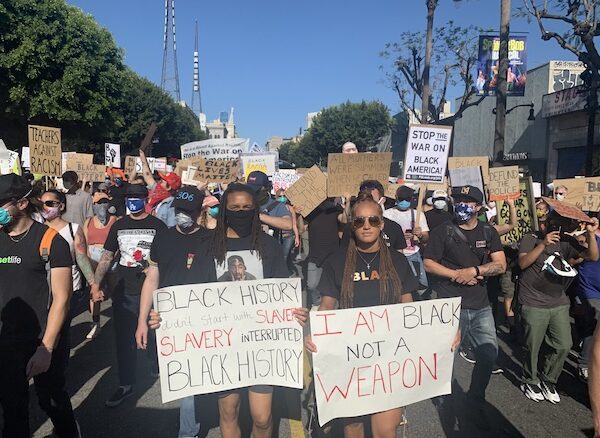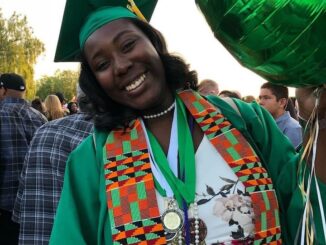
Many professional and collegiate-level athletes are taking a stand against racism and utilizing their platforms to amplify Black voices protesting against police violence.
After a summer of protests following the police-caused deaths of George Floyd and Breonna Taylor, the shooting of Jacob Blake led the NBA’s Milwaukee Bucks to boycott their playoff game, prompting a chain reaction of other NBA, WNBA and MLB teams to do the same. Previously, athletes like Muhammad Ali, Colin Kaepernick and LeBron James paved the way for athletic activism.
Athletes at Pepperdine University are doing the best they can to initiate change.
“I want to be remembered as more than an athlete,” said Colbey Ross, a senior sport administration major and Men’s Basketball player. “I want to be remembered for making a change in the world.”
Student-athletes at Pepperdine are not afraid to use their voices. In fact, Pepperdine Athletics encourages them to do so. However, student-athletes argued that this is not enough. To them, change goes beyond using one’s voice. Change is found in empathy, education, shifting thought patterns and voting.
Why athletes want to use their platform
Black male athletes were among the most powerful and influential voices during the 1960s civil rights movement, Danielle Combs wrote in a July 18 Sage Journal. The resurgence of athletic activism heightened after the death of Muhammad Ali.
Today, collegiate athletes are following in the footsteps of their professional predecessors.
Fans around the nation watch college sports. This means that Division I athletes are in a position to be agents of social change because of their significant platforms. Nearly 70% of fans said they support the Black Lives Matter movement, compared with 62% of the general population, David Wharton wrote in a July 29 Los Angeles Times article.
Jayda Ruffus-Milner, a junior psychology major and Women’s Basketball player, has been at the forefront of campus efforts to spread awareness of police brutality issues against Black Americans.
“I’m a part of WLC, the Waves Leadership Council,” Jayda Ruffus-Milner said. “I’ve been able to work with them and facilitate conversations, trying to keep the conversations and education within athletes.”
Jayda Ruffus-Milner shared a powerful slam poem on her Instagram titled, “White Box” where she talks about unique struggles that Black people face in America.
Her twin sister and teammate, junior sociology major Jayla Ruffus-Milner, shared her interpretation of the poem.
“It’s pretty difficult when you’re a part of a minority in a larger group and you see a lot of privilege,” Jayla Ruffus-Milner said. “And you’re like, well why aren’t there more people that look like me? It’s just trying to understand that you’re not confined by limitations.”
Jayla Ruffus-Milner said people have to remember that athletes are not just athletes, they are human beings with real feelings.
“This is my life, these are my struggles, these things affect me as a human being not just an athlete,” Jayla Ruffus-Milner said. “Being an athlete isn’t who I am, it’s what I do. No matter what job you’re in, what social environment you’re in, you are still yourself at the end of the day. You come from a long history of different struggles.”
Pepperdine student-athletes argued that the Black Lives Matter movement is not a political issue. Rather, it is an issue that surrounds basic decency for human life.
“If you are neutral in situations of injustice you have chosen the side of the oppressor,” Ross said. “As an athlete, white or Black, if you’re not standing up for human rights then you have chosen the side of the oppressor.”
Living in fear
Black people in America face a unique vulnerability and are living in constant fear of police brutality and systemic racism. Based upon recent and historical events, many Black Americans fear that the very people whose job it is to protect them will kill them.
“I have four brothers,” said Tiffany Egbo, junior nutrition major and Track and Field runner. “That’s where the fear goes to. I want a better future for them and my kids.”
Alexa Ortega, junior public relations major and Track and Field runner said it breaks her heart to see her friends and teammates in the Black community in pain after the death of George Floyd.
“I think that’s what struck me the most,” Ortega said. “The idea that there are people close to me that live in fear for their lives everyday.”
Being a Black man in this country is not easy, Ross said. He and other Black men have anxiety embedded in them as they go through life.
“As a Black man there is fear planted in your mind from a young age,” Ross said. “It is really difficult to see videos and hear stories about Black people being killed for doing nothing.”
Allies
The Black Lives Matter movement has allies of different races and not just members of the Black community. Student-athletes recognized that conversations about racism may be challenging, but in their eyes, that doesn’t excuse anybody from having them.
“As non-Black Americans we have a responsibility to step up, change and speak out, call it out when we see it, that’s where the change really comes from,” Ortega said. “Right now the issue that has brought this to light is police brutality but I think it goes so much beyond that and it goes further into how we as non-Black people are going to step up and say wait we’re not going to tolerate this anymore. We’re not going to let people like us or people of other races continue this behavior. We have to come together and stop that.”
Although athletes have a bigger platform, students said every human being has the ability to address issues of racism.
“It is important for us, nobody is exempt from it, to be able to have these difficult conversations with your friends and your families and really put everything out on the table and address things,” said Calista Reyes, senior sports administration major and Women’s Soccer player. “We can’t just pretend like there’s no harsh reality to certain things going on.”
Recognizing privilege
Student-athletes agreed that one of the most crucial steps in working toward equality is checking one’s own privilege.
“People should understand that there are certain struggles that certain groups don’t necessarily go through on a daily basis,” said Spencer Wickens, senior sport administration major and Men’s Volleyball player.
“When I’m driving on the road, when I see a cop I freak out and slow down and I get scared about getting pulled over but it’s obviously a very different experience if you’re a Black person that sees a cop and fear that you will be killed,” Ortega said. “I think putting it into perspective as a non-Black person is what makes me think I have a responsibility to fulfill and so does every other non-Black person and it goes down to these thought patterns that we’ve allowed for so long.”
In order to have these difficult conversations, Wickens said it requires people to have more empathy.
“It’s tough because it can be uncomfortable but it is better to understand,” Wickens said. “People should understand that there are certain struggles that certain groups don’t necessarily go through on a daily basis.”
Conservative pushback
Conservative thinkers, such as Fox TV Host Laura Ingraham, have disagreed with the athletes’ involvement in protests for Black lives. After LeBron James criticized President Donald Trump in an ESPN interview in 2018, Ingraham said she “is not interested in getting political advice from someone who makes $100 million a year.” She said James should “shut up and dribble,” Emily Sullivan wrote in an NPR article.
Athletes at Pepperdine had strong opinions about this reductive perspective.
“Just because you’re an athlete doesn’t mean you should be limited to just using your body,” Jayda Ruffus-Milner said. “We also have minds as well, we’re also human and we have other things that affect us that we will address.”
More recently, after NBA teams postponed games in response to the Jacob Blake shooting, Trump said mixing politics with sports is terrible, Libertina Brandt wrote in a Aug. 30 Business Insider article.
“I think what they’re doing in the NBA in particular is going to destroy basketball,” Trump told a White House press pool. “It’s going to be very bad for football and I think it’s very bad for the NBA. Maybe even NBA threatening. And it’s going to be very bad for baseball if they don’t get smarter.”
In 2016, Former NFL player Colin Kaepernick, who is now a free agent, knelt during the national anthem in San Diego in efforts to peacefully protest police brutality. Trump openly opposed his kneeling during the national anthem, Jason Reid wrote in a Sept. 24 The Undefeated article.
“Wouldn’t you love to see one of these NFL owners, when somebody disrespects our flag, to say, ‘Get that son of a b—- off the field right now,’” Trump said at a rally. “Out. He’s fired! Fired!”
While some critique Colin Kaepernick for kneeling, others said they found his actions inspiring.
“Seeing what Colin Kaepernick did empowers me,” Ross said. “He put so much on the line. It took his job away but he stood up for what was right.”
What Athletics is doing
Pepperdine Athletics has made it clear that they are in full support of their athletes standing up for what’s right.
“I think our student-athletes can be leaders in this regard and that’s what we’ve talked about,” Pepperdine Athletic Director Steve Potts said. “We want to make sure that our student-athletes know that they can express their voice. We want them to use their voice.”
Today, it’s more common for student-athletes to be outspoken about politics. However, Lorenzo Romar, Pepperdine head Men’s Basketball coach, said it wasn’t always this way.
“For so long many felt like if you did speak out on something that you were experiencing that is unfair and stifling and sometimes traumatizing, you’re a rebel, you are militant,” Romar said.
Romar said he is proud of how Pepperdine Athletics has handled these tumultuous times.
“I am so proud of this university that I work at,” Romar said. “Our athletic director, my boss, Steve Potts, is 100% behind making sure that there’s an environment here that promotes equality. The President Jim Gash here formed an action committee to make sure that we can make changes within this campus so that all people feel accepted and supported on this campus.”
Taking action against racial injustice is a group effort. Potts said one of the most important duties in this fight is educating oneself and others.
“We’re all learning through this and we all need to be educated, not only on the issues involved, but how we can best address those issues,” Potts said. “Those are things that I need to learn, I have to learn, and I am trying to learn what would be the best way for me as the director of athletics at Pepperdine University to make sure that I’m addressing these issues in an appropriate way.”
The Athletic Department works closely with athletes, coaches, Waves Leadership Council and other faculty members to foster a more inclusive campus culture. Potts said Title IX Coordinator La Shonda Coleman has been a leader in making sure all staff members are educated.
“We had training last week led by La Shonda Coleman with our coaches and our staff and we spent about two hours talking about how these discussions should not be debates, you know, we aren’t trying to win an argument,” Potts said. “These conversations should be dialogue. I need to hear what you’re saying, I need to hear your side, I need to understand as best I can how the issue impacts you.”
Although student-athletes said they are continuously receiving support from the Athletics department to use their voice, collectively they agreed that there’s still more work to be done at a community level.
Addressing racism at Pepperdine
An Instagram account called @blackatpepperdine surfaced over the summer with content leaving many students devastated. According to the account biography, the purpose of the account is to amplify the voices of past and present Black members of the Pepperdine community. Participants anonymously submit their experiences with racism and microaggressions via direct message, and the account posts their stories publicly.

Potts said the post’s description of the situation is inaccurate.
“It wasn’t characterized accurately,” Potts said. “When that incident occurred, immediately, the head coach involved came to me. He explained to me what had happened, and we both agreed that we needed to take action against that particular student. Within hours, that student-athlete was in my office, with the head coach, and we explained that he was going to be suspended. We let that student-athlete know that we would have a follow-up conversation the next day, which we did. We had a conversation with the student-athlete, a parent on the phone, and it was that conversation when the head coach informed the student that he was being dismissed from the team. That is what happened. I took it seriously and I think we made it clear that we supported the individual that was the object of that remark.”
What students want to see
Student-athletes at the university have made it clear that in order to progress in this fight against racial injustice, there needs to be accountability, difficult conversations, education and recognition that none of this will happen overnight.
“You don’t need to do anything extravagant like make a YouTube channel or a website to make change,” Jayla Ruffus-Milner said. “Change is in the little things like keeping people accountable, educating them and having conversations with your peers.”
Egbo said keeping people accountable doesn’t mean engaging in hostility, but it does involve educating people who say racial slurs.
“Just be ready to educate and use your voice,” Egbo said. “Not in a harsh way, but just share how you feel about it and I think that’s good for everyone to know.”
Regarding recent protests against police brutality, Romar said he doesn’t agree with rioting and looting. He insists that there are better and safer ways to go about activism, like posting on social media, having conversations with friends and families and peacefully protesting.
“I do not agree at all with protests that have violence,” Romar said. “That doesn’t do anything.”
Pepperdine student-athletes participated in an organized campus democracy challenge throughout the month of September called All In To Vote, where each team registered to vote and posted on their Instagram stories once they were done.
“Our generation, last election, had the most amount of eligible voters in the U.S. but least amount of actual votes,” Ortega said. “Athletics noticed that and wanted to make sure that as athletes we were doing our part, making sure we are registered to vote.”
Student-athletes stressed the importance of practicing one’s civic duty, especially when trying to make change.
“If we’re going to complain about something then we need to vote on it,” Egbo said. “At least we can say we put our two cents in it and say we used our voice.”
Pepperdine athletes are acting as catalysts for change.
“Being an athlete, a lot of people are just drawn to you naturally,” Jayda Ruffus-Milner said. “So why not spread a message, whether they want to hear it or not they still see it, that’s what I’m trying to do.”
Rianna Dizon completed the reporting for this story in Jour 241 in Fall 2021 under the supervision of Dr. Christina Littlefield and Dr. Theresa de los Santos. Dr. Littlefield supervised the web version of the story.




